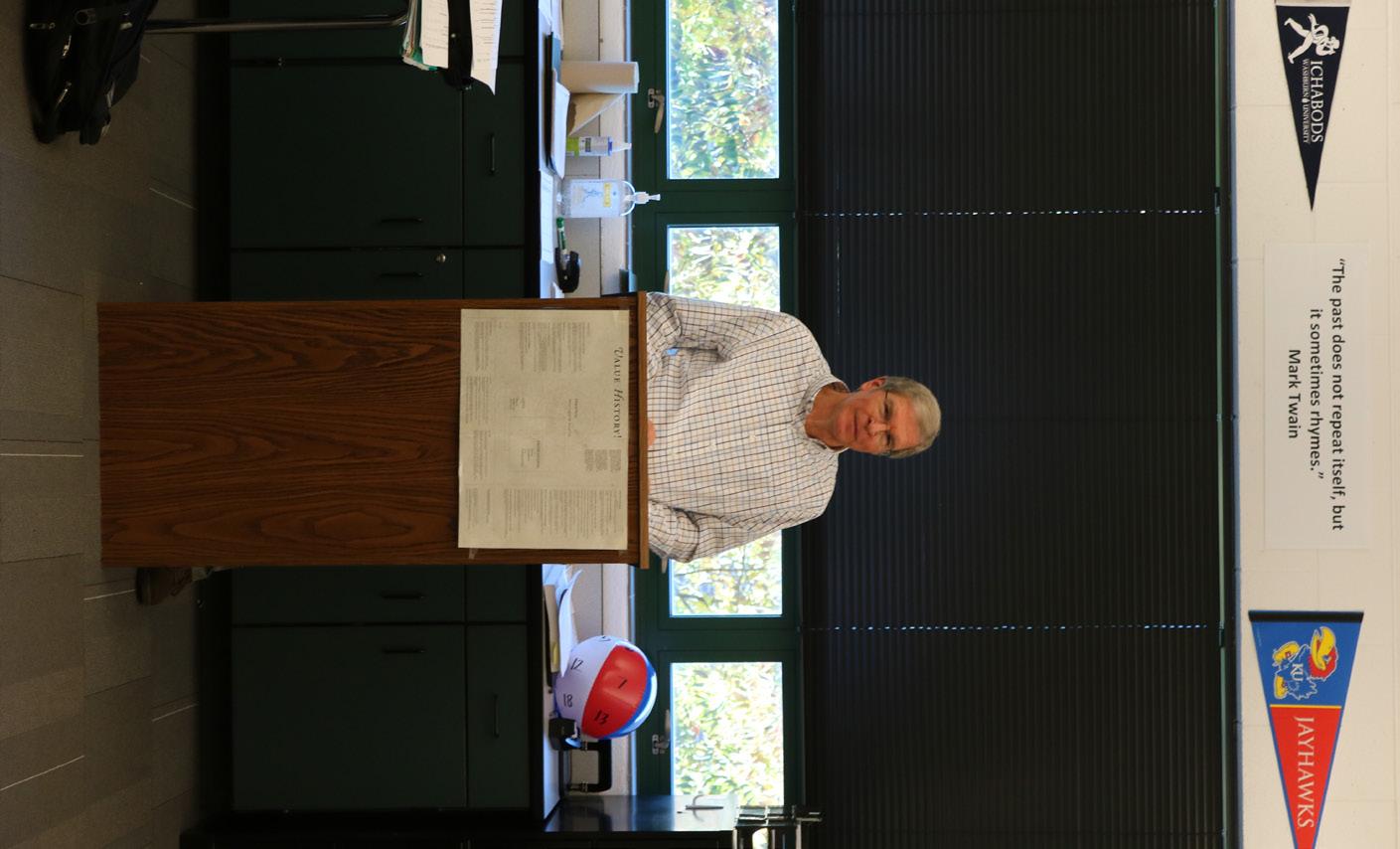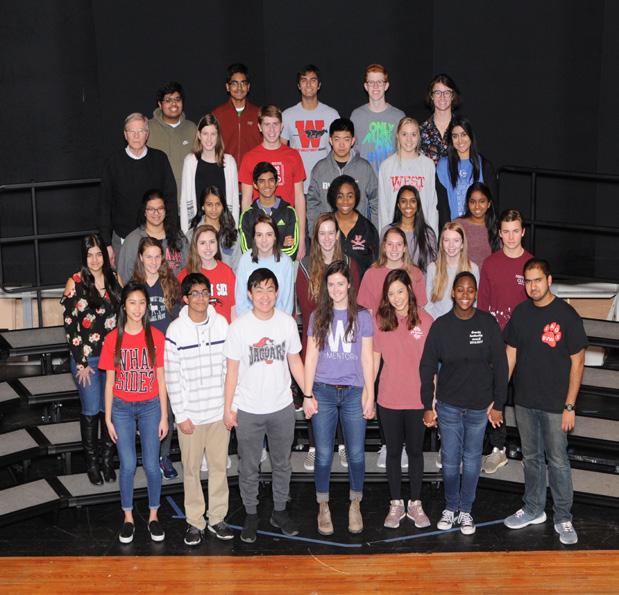
7 minute read
Stuewe’s Retirement
from Spotlight Feb. 2020
by Spotlight
A N e w C h a p t e r
E s t . 2 0 0 6
Advertisement
After 14 years at BV West, Mr. Stuewe’s teaching career comes to an end
Ally Madden
reporter
Teachers can greatly impact a student’s life. Amazing teachers change the lives of kids and inspire them to reach their goals. A perfect example of a great teacher is Paul Stuewe, the AP European History teacher, who helped and taught hundreds of students during his 14 years at BV West. As his teaching career comes to a close with his retirement at the end of the year, Stuewe and a few students reflect on his career.
Though Stuewe is now a well-respected teacher, he did not plan on becoming entering the profession until he found his passion in college. While majoring in history for a potential law degree, Stuewe realized that it wasn’t the law that fascinated him but rather his major. This interest became the beginning to a long and successful career.
“I majored in history, which was a good thing to major in if you’re going to law school,” Stuewe said. “The more I studied it, the more I liked it more than the law. I thought, ‘what can I do with history that would really engage me? Teaching.’”
After college, Stuewe did a stint in the military, backpacked across Europe and then began teaching at a small high school in Kansas. Many years into his career, Stuewe decided it was time to retire. However, he realized later that he wanted to continue.
“Probably the stories
students enjoy the
most are from my
military experience
being in Europe
during the Cold War
and being drafted
during the Vietnam
War.”
stuewe said
“Technically I retired 14 years ago the first time and I thought I might do something else. But the more I thought about it, the more I didn’t want to do anything else,” Stuewe said.
Stuewe returned to his teaching career and began working at BV West 14 years ago. Stuewe said he still remembers his first day teaching and how beautiful the school looked.
“My first memory was driving up. I had never been here before, so driving up the driveway, I just couldn’t believe it. It was such a beautiful school,” Stuewe said. “It looked more [like a community college] with all of the fields out there.” Though Stuewe loves history and his students, he is retiring in May 2020.
“I am retiring for good now because I’m 70 and so that’s a good time to retire,” Stuewe said. “Oh, it’s too hard to define one moment in my career. It’s an accumulation of moments that have been really good.”
People generally choose to become teachers so they can help others and spread their knowledge. These moments made teaching worth it for Stuewe.
“I would say in my classes when I’m talking about European history and I see kind of the light bulbs come on in people’s eyes in terms of understanding,” Stuewe said. Junior Nick Edwards, a former AP Euro student and the current History Club president, worked with Stuewe often in the past few years and feels grateful for the opportunities that Stuewe gave him.
“In the past couple years, Mr. Stuewe has given myself and the other History Club officers many tools to lead and now with him eventually leaving the building, he has given the mantleship of History Club to us officers,” Edwards said.
In addition, Edwards shared how Stuewe approaches teaching in an interesting and engaging way. As a Vietnam veteran, Stuewe is able to use his experience from war to give a unique perspective on history. His students are able to connect through the stories and be more engaged.
Edwards said that Stuewe’s stories, describing his first hand experiences with the content he teaches, were providential to the success he had in the class.
“Mr. Stuewe mixes his lectures with a lot of personal stories and background. Because he has such a broad understanding of history, he is able to connect it to us on a deeper level,” Edwards said.
Stuewe was aware of the impact his personal stories had on his ability to connect historical examples to students.
“Probably the stories [students enjoy the most] are from my military experience being in Europe during the Cold War and being drafted during the Vietnam War,” Stuewe said.
As he parts ways with BV West and his students, Stuewe reflects on what he will miss most about teaching. “Well, I know this sounds cliche, but it’s really true, the students and being able to meet the students. I get to know them, work with them. And then the other thing is a captive audience to talk to about history with,” Stuewe said.
Like hundreds of former students, many Jaguars are sad to see him go but will make sure to keep in contact.
“The biggest thing I will miss about Mr. Stuewe is his attitude and admiration for history and just seeing him in the halls of West. I know I will keep in touch with him after he is gone,” Edwards said.
Though some students did not have the privilege to be in Stuewe’s class, the students who had him will remember the joy and excitement he brought to history.
Big smiles from Stuewe on Picture Day. He had a new photo taken every school year and is one of a few teachers who has a yearbook from every year he taught at BV West.
Posing with the 2018-19 History Club members, Stuewe stands proudly with fellow history buffs.
Caught in action, Stuewe stands at his usual teaching position behind the podium and under his pennants from KU and Washburn University. His sense of humor was evident in the Mark Twain quote he displayed in Room 374.


Photos courtesy of the yearbook archive
SURVEILLANCE
The same text message from parents has appeared on the phones of teens everywhere: “Turn your Life360 on. Make sure you set your location permission to always.” These words spur a variety of emotions in the hearts of young people, often ranging from anxiety to anger. A fun night with friends can go awry as kids feel trapped under the supervision of parents.
While technology has opened up a new world of social connection for teens, parents can easily limit that world with the click of a button. Parents can install apps that closely monitor their child’s digital activity, giving them access to everything from their child’s text messages to their driving speed. However, out of the wide range of protective parenting apps that exist, one of the most common and controversial is the location-tracking app.
Location-tracking apps are used to pin-point the location of an enabled device. Typically, families or
Or
SAFETY?
Teens feel that location-tracking apps invade privacy
Jillian Dunlay reporter
friends will install the same location-tracking app to connect all of their phones and have access to one another’s locations. Some of the most popular apps include Life360 and Apple’s Find My.
“My mom primarily uses Life360 to monitor where my brother and I are,” senior Jason Garlett said. “She also makes sure that I’m driving safely. If I ever get into an accident, I know that my mom would be able to immediately see where I am.”
The idea of location-tracking apps appears beneficial. If a child has not contacted their parents for a long period of time, parents can check their child’s location by simply opening an app on their phone to make sure that their kid is safe.
Senior Emily Meade recognizes the usefulness of location-tracking apps.
“My family uses Life360 to know where I am if something happened and I didn’t have access to my phone. Also, it allows me to not have to check in constantly,” Meade said. “I don’t see many negative effects [of using the app] as my parents do not personally overstep boundaries. We have a trusting relationship. It makes me and them feel better to know where I am and what I’m doing. It [also] could be useful for the police in the event of something serious happening. I think every family should have the app.”
While location-tracking apps can be advantageous for some families, the apps can also limit the freedom of teens. Many teens are required by their parents to keep a location-tracking app installed on their phone. By being forced to have the app, teens can perceive it as a way for their parents to prevent them from growing into independent adults. It can make kids uncomfortable as they feel that their parents are constantly watching over their shoulder and tracking their every move.
“A lot of times it seems like










